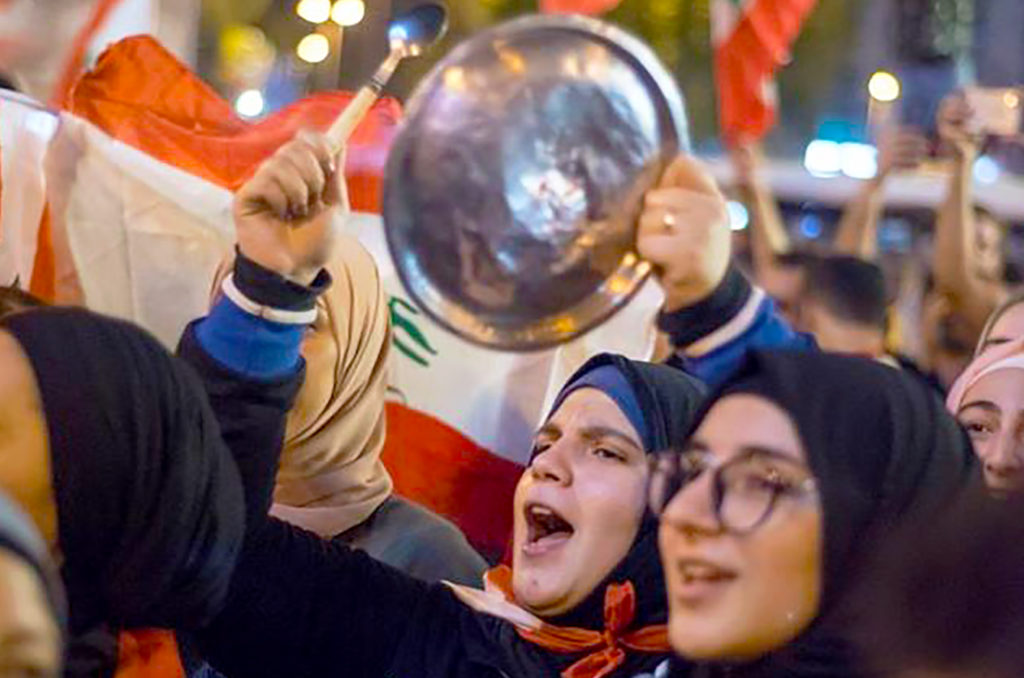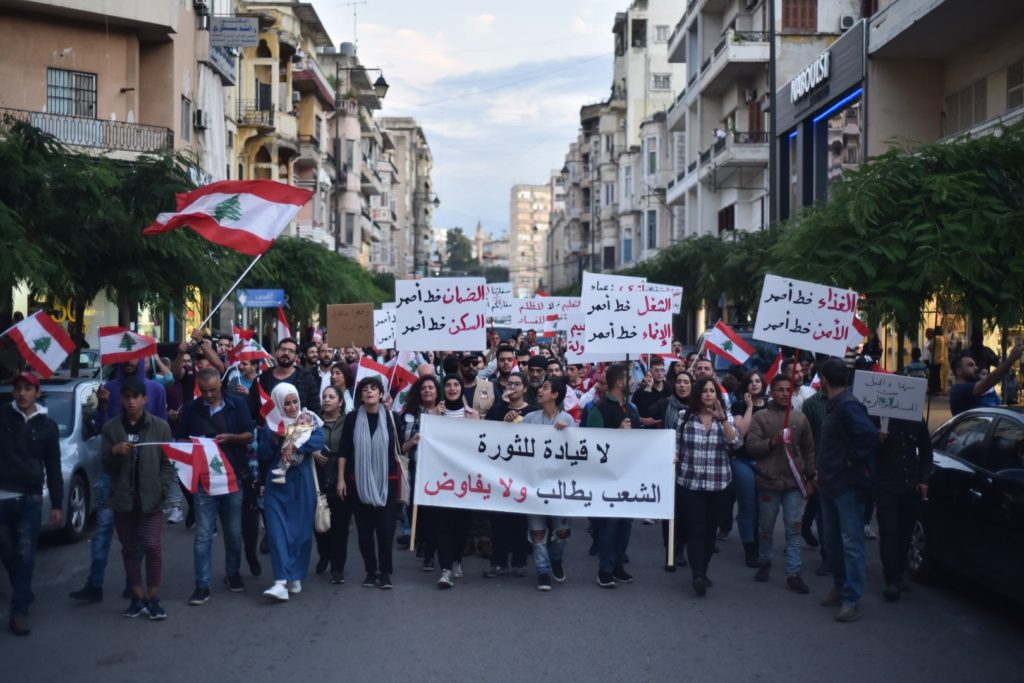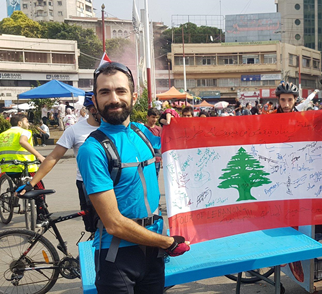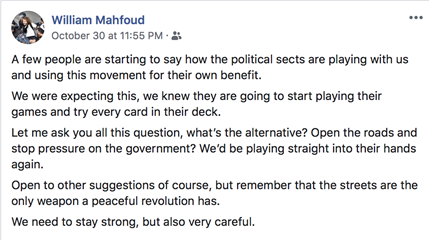Lebanon: A Revolution — Inside/Out
Posted in: Society & culture, Voices from the field
Messages from Lebanon’s youth


I was in Washington DC last month for Anera’s annual gala on October 11. During my visit, I also participated in a series of strategic meetings and events. I had a very fruitful week there. I met young professionals who, like me, work in the field of development.
I also met young Arabs who have lived in DC for years and local university students. One thing they all had in common was a total lack of regret for leaving the Middle East and moving abroad. I admit it made me feel hopeless.
In DC, I see no garbage on the streets. I breathe clean air. I sense the sheer number of opportunities available. In my idealistic moments I resolved to go back to the region and continue to try to make things better. But to be completely honest, I too wanted to leave.
I’m tired of the perpetual, never-changing and gloomy status quo. I am tired of corruption and bad governance affecting my day-to-day life as a young person, and specifically as a Syrian in Lebanon.
Of course, when I think of others — Lebanese people who are struggling with unemployment, people who cannot afford to pay for electricity or clean water — I remember to keep my situation in perspective. Unfortunately, their numbers are increasing. At such times, I remember that I am blessed and lucky.
But so what? Is my own comfort enough to silence me? What about empathy? What about my core belief that human beings are an intertwined collective? I really believe that we will never be well unless we are all well. So I go back to Beirut, my second home, the place which I have lived in the longest so far, and I will try my best to help. Of course I’m not alone.


Lebanon’s protest movement
During my last two days in DC, news of the demonstrations started taking over the social media channels I follow. My friends were sharing nothing but posts and photos about the demonstrations. They were part of the demonstrations and just like everyone else, they were angry.
As a Syrian, I could only think to myself, “Is this it? Have the Lebanese people finally reached a tipping point of resentment and suffocation? I mean, how much pollution and deficiencies in the most basic public services can a population endure?”
As my plane was landing in Beirut I could see fumes across the city and what looked from afar like small fires. They were actually burning tires, a means of blocking roads employed by the protesters. I had flashbacks to the early days of the Syrians revolution. I had only one thought: “I hope this one remains apolitical.” Politics – political parties and sectarian divisions – ruin everything.
But enough on my perspective. I want to share the voices of young Lebanese revolutionaries — and yes, I dare to call them revolutionaries. What is happening in Lebanon is a revolution of the mind, a revolution of the heart, a revolution against exploitation, a revolution against sectarianism. It is a rejection of the oldest trick in the book: to divide and conquer.
Voices from the protests*
My friend Natheer Halwani is a photographer who has been on the ground since day one of the protests, documenting the events and actively participating in the peaceful demonstrations in Tripoli. I asked him to share his thoughts on the Lebanese revolution and how he sees his role as a young person.
“I see myself as a photojournalist mainly. The thing that I have been doing for other countries is now something that I can contribute to my own, which is publishing photos that reflect the situation as it is with a hint of storytelling. But first and foremost, as a Lebanese person, I am participating in discussion groups, side projects and one-on-one debates on the political future of the country.”


Another young revolutionary asked to remain anonymous — we will call her M.R. An artist and civil society activist, she said, “Our power is in numbers, so I made it my mission to raise awareness among people who fear change, people who want to see change but resist the notion of protesting or being on the ground with us.”
I asked them both about the priorities and demands of young people and what they are asking for. Natheer says,
“The first thing I can think of is more job opportunities. The unemployment rates are extremely high. The educated portion of the Lebanese youth all know the potential that resides in Lebanon and the amount of jobs that could be created if it weren’t for corruption and mismanagement schemes.
“Aside from that, the youths also demand freedom of expression, given the unparalleled number of arrests in the last decade. One more thing is a decent health care system, established on the basis of the benefit of all for the lowest cost possible. The people yearn for a drastic reform that could achieve those demands, especially now with emerging videos on social media from governments like New Zealand’s and their incredible achievements in the last two years.”
M.R. says,
“I want to know that if I work hard, I can have a seat at the table — that I can represent my people in local government and I could even one day try to take a leadership position without having to fear for my life. I want to dream big.”
I asked them how people are organizing themselves and about the tools that they are using. Natheer says,
“People on the ground are mostly using social media, Facebook being the biggest of those, especially with the amount of space it gives to collaborate, post events, start discussion groups and so on. Another essential tool is WhatsApp, a communication platform that is mobilizing people on the streets, letting everyone know what to do and when to do it. Those, on top of other tools such as emails, SMS and others, have made it dramatically easier for people to cross borders and still collaborate and plan together.”
Inclusivity
The beauty behind this movement is its inclusivity. I am seeing people from different walks of life gathered together and chanting their unified demands — people who might have never crossed paths due to the strict sectarian partisanship and lack of shared public spaces.
A friend of mine, Sasha Elijah, is a feminist revolution all by herself. A young trans activist, she has been taking part in the protest along with hundreds of Lebanon’s LGBTQ+ community members.


They are demanding the fall of the patriarchal system which deprives people of their basic human rights. Sasha wrote in a Facebook post,
“To all LGBTQ+ members at the frontlines of this revolution, I salute you. To all women fighting every day with no fear and feeding the revolutionaries, I salute you. To every man stomping his feet on the ground for a better change, I salute you. Stay strong, stay brave.”
Tarek Zeidan a Harvard human rights and law graduate and the executive director of Helem, the first LGBTQ+ organization in the Arab world, founded in 2004, says,
“The majority of the LGBTQ community has been suffering from the same social and economic constraints resulting from the culture of corruption and impunity permeating the Lebanese state [as the rest of society].
“We have taken the same sense of ownership over our own future as the rest of the people on the streets. Our community is also suffering from poverty, homelessness, lack of health care and unemployment, which is the same as the rest of the people living in Lebanon and therefore we belong on the streets with them.”
Lessons
I asked them what lessons they have learned from the revolution. Natheer says,
“Regardless of what lies ahead, Lebanese people can indeed come together under one umbrella. And if it happens in Lebanon, it can happen literally anywhere in the world. I also learned that the Lebanese, especially the people of my city [Tripoli] who otherwise had been known for being rigid and firm, turned out to have hearts so big, their love and compassion embrace those they’re standing up against.”
Another friend, William Mahfoud, has been, like many other youth, literally camping on the streets of Beirut. He is an electronic music producer and renowned DJ with a message, which he conveys through his music and on social media. William spent his teenage years as a rebellious and angry punk rocker and skater. He says,
“I have been waiting my whole life for this. The most important thing I’m learning is patience. It’s not easy to stay calm in the face of violence. It’s not easy to stay calm in the face of a drunk protester who can ruin it for everyone. It’s not easy to stay calm when you have 50 guys the size of a brick wall running at you. It’s especially not easy when you’re running on 2-3 hours of sleep.”
When I ask them to describe the uprising in a single word, they say things like “breathtaking,” “hope,” “exhilarating,” “dream,” and “future.” William suggests a slightly different term:
“Overwhelming. If there was a word for love and hate, and happiness and anger, and sadness and exhaustion, that would be it. It really feels like breaking up with an abusive partner — when you’ve finally realized that they’ve been taking advantage of your kindness and stupidity, and you’re trying to find a healthy way to cut the cord.”


Tarek comments,
“I think we’ve already won the social revolution and that alone gives me hope. What gives me pause is thinking about how we are going to obtain the maximum tangible wins from this movement and ensure it does not get co-opted or strategically mismanaged and lead to conflict.”
Yara, a young civil society activist from the Bekaa Valley, says, “This uprising showed us that the Lebanese people have a yearning to make this collective journey.”
*Some quotes have been lightly edited for clarity.
Serene Dardari is Anera’s communications manager in Lebanon
OUR BLOG
Related
In Gaza, systematic bombardment of civilian housing and infrastructure has created a crisis of shelter that is endangering over a million.
The undersigned members of the Association of International Development Agencies (AIDA) urgently call upon the international community to intervene and halt settler attacks targeting Palestinian civilians and protect Palestinian communities near illegal settlements. The International NGO Community urges international actors…
